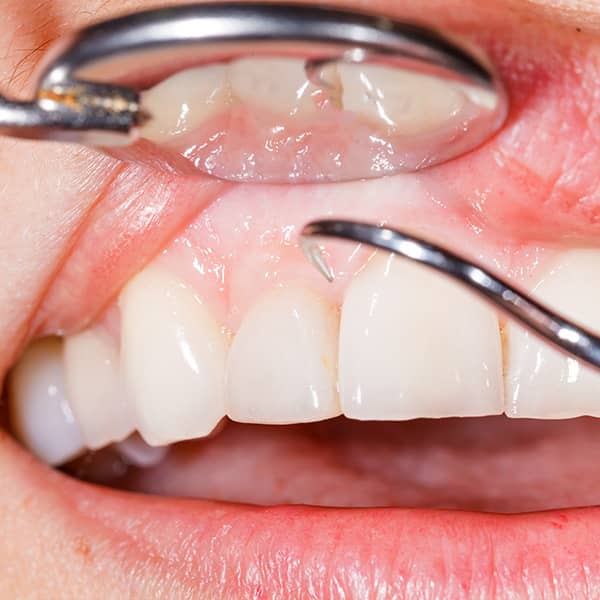Home / Dental Services / Periodontal Disease Treatment
Gum Disease Treatment in Miami
Periodontal disease, or gum disease, is a common but serious oral health issue that affects people of all ages. Periodontal disease is responsible for nearly 50% of adult tooth loss. You can prevent and treat periodontal disease by scheduling an appointment with Gallardo Periodontics Specialists in Miami.
Gum Disease Treatment Benefits
01
Gum Health Restoration
Treatment for periodontal disease helps restore the health of the gums by eliminating infection, reducing inflammation, and preventing further damage to the gum tissues and underlying bone.
02
Prevention of Tooth Loss
Periodontal disease is a leading cause of tooth loss in adults. Timely treatment can halt the progression of the disease, preserving the natural teeth and avoiding the need for extractions or tooth replacement options.
03
Overall Health Promotion
There is a strong connection between periodontal disease and systemic health conditions like heart disease and diabetes. Treating periodontal disease not only improves oral health but also contributes to overall well-being.
Periodontal disease develops when harmful bacteria in the mouth cause inflammation and infection in the gums and supporting structures of the teeth. While genetics and age can play a role, most cases are the result of preventable lifestyle and oral hygiene factors. Identifying and addressing these causes early can greatly reduce the risk of developing or worsening gum disease.
Common causes of periodontal disease include:
- Poor Oral Hygiene: Inadequate brushing and flossing allow plaque to build up along the gumline, leading to infection and inflammation.
- Tobacco Use: Smoking, chewing tobacco, and even vaping significantly increases the risk of gum disease and also impairs the healing process after treatment.
- Hormonal Changes: Fluctuations in hormones, especially during pregnancy, menstruation, or menopause, can make gums more sensitive and vulnerable to disease.
- Chronic Illnesses: Conditions like diabetes or other diseases that interfere with the immune system can reduce the body’s ability to fight infection.
- Medications: Some medications can affect oral health by reducing saliva flow, which helps protect the gums and teeth.
- Genetics: A family history of periodontal disease may increase susceptibility, even with good oral hygiene.
- Stress: High stress levels can weaken the immune system, making it harder for the body to combat gum infections effectively.
- Poor Nutrition: A diet lacking essential nutrients, particularly deficiencies in vitamin C and vitamin D, can compromise gum health and immune function.
- Obesity: Excess body fat is associated with increased inflammation in the body, which can negatively impact gum health.
- Recreational Drug Use: The use of certain drugs can contribute to dry mouth, poor oral hygiene, and damage to the gum tissues, all of which increase the risk of periodontal disease.

What causes periodontal disease?
Periodontal disease develops when harmful bacteria in the mouth cause inflammation and infection in the gums and supporting structures of the teeth. While genetics and age can play a role, most cases are the result of preventable lifestyle and oral hygiene factors. Identifying and addressing these causes early can greatly reduce the risk of developing or worsening gum disease.
Common causes of periodontal disease include:
- Poor Oral Hygiene: Inadequate brushing and flossing allow plaque to build up along the gumline, leading to infection and inflammation.
- Tobacco Use: Smoking, chewing tobacco, and even vaping significantly increases the risk of gum disease and also impairs the healing process after treatment.
- Hormonal Changes: Fluctuations in hormones, especially during pregnancy, menstruation, or menopause, can make gums more sensitive and vulnerable to disease.
- Chronic Illnesses: Conditions like diabetes or other diseases that interfere with the immune system can reduce the body’s ability to fight infection.
- Medications: Some medications can affect oral health by reducing saliva flow, which helps protect the gums and teeth.
- Genetics: A family history of periodontal disease may increase susceptibility, even with good oral hygiene.
- Stress: High stress levels can weaken the immune system, making it harder for the body to combat gum infections effectively.
- Poor Nutrition: A diet lacking essential nutrients, particularly deficiencies in vitamin C and vitamin D, can compromise gum health and immune function.
- Obesity: Excess body fat is associated with increased inflammation in the body, which can negatively impact gum health.
- Recreational Drug Use: The use of certain drugs can contribute to dry mouth, poor oral hygiene, and damage to the gum tissues, all of which increase the risk of periodontal disease.
Symptoms of gum disease
HEALTHY AND UNHEALTHY GUMS
Recognizing the signs of gum disease early is key to preventing long-term damage. Gum health can often decline silently, so it’s important to be aware of the visual and physical indicators that something may be wrong. Below are the characteristics of healthy gums contrasted with symptoms commonly associated with gum disease.
Healthy Gums Typically Have:
- A firm, pink appearance
- No bleeding during brushing or flossing
- A snug fit around the teeth
- No persistent bad breath
- No visible swelling or sensitivity
Signs and Symptoms of Gum Disease Include:
- Red, swollen, or tender gums
- Bleeding during brushing or flossing
- Receding gums or longer-looking teeth
- Persistent bad breath or bad taste in the mouth
- Loose or shifting teeth
- Formation of deep pockets between the teeth and gums

Types of Gum Diseases
Gum disease progresses in stages, beginning with mild inflammation and potentially advancing to more severe forms that can damage the bone and tissues supporting your teeth. Understanding the differences between these types helps highlight the importance of early detection and treatment.
Initial Gingivitis
Gingivitis is the earliest and most common form of gum disease. It causes mild inflammation of the gums, often due to poor brushing and flossing habits that allow plaque to build up along the gumline. Gums may appear red and swollen and bleed easily when brushing or flossing. Fortunately, gingivitis is reversible with improved oral hygiene and professional cleanings. Contributing factors can include poorly fitting dental appliances and hormonal changes, such as those during pregnancy.
What is Gum Disease?
Advanced Periodontitis
Necrotizing Periodontal Disease
When left untreated, gingivitis can develop into periodontitis—a more serious stage of gum disease that causes irreversible damage to the tissues and bone supporting the teeth. In its advanced form, periodontitis can lead to gum recession, deep pockets, loose teeth, and even tooth loss. This chronic infection may also contribute to inflammation in other parts of the body and increase the risk of systemic health issues. Advanced cases may require surgical intervention to control the disease and restore oral health.
Necrotizing periodontal disease is a rare but severe form of gum disease typically found in individuals with compromised immune systems. It progresses rapidly and causes extensive destruction of the gum tissues, ligaments, and surrounding bone. This condition is extremely painful and may be accompanied by ulcers, foul breath, and spontaneous bleeding. Smokers and individuals under extreme stress or with chronic health conditions are at greater risk for developing this aggressive infection.
The Importance of Early Treatment for Gum Disease
Gum disease is more than just an oral health concern—it can lead to serious complications such as tooth and bone loss, and has even been linked to systemic issues like heart disease and diabetes. These risks make early intervention essential for protecting both your smile and your overall health.
At Gallardo Periodontics and Implant Dentistry, we encourage anyone experiencing symptoms of gum disease to seek evaluation promptly. Early treatment not only helps reverse damage but also reduces the need for more invasive procedures later on.

Periodontic Treatments
Treating periodontal disease involves personalized care tailored to the severity and progression of the condition. Depending on how far the disease has advanced, treatment can range from deep cleanings and non-surgical therapies to more complex surgical interventions aimed at restoring gum and bone health.
Non-surgical Periodontal Therapy
When caught early, gum disease can often be managed or reversed with non-invasive treatments. These approaches focus on reducing harmful bacteria and preventing further progression without the need for surgical intervention.
Professional Dental Cleanings: Routine cleanings remove plaque and tartar from above the gumline. Patients at risk for gum disease may require more frequent cleanings to maintain gum health and minimize bacterial buildup.
Scaling and Root Planing: This deep-cleaning procedure involves removing plaque and tartar from both above and below the gumline (scaling), followed by smoothing the root surfaces (planing) to help the gums reattach to the teeth and prevent future buildup.
LANAP® Laser Treatment: This minimally invasive therapy uses laser technology to target and remove diseased gum tissue while preserving healthy tissue. LANAP also promotes healing and encourages the regeneration of bone and connective tissue, making it an effective non-surgical alternative for treating moderate to advanced gum disease.
Surgical Treatments
When non-surgical methods are not sufficient to control gum disease, surgical procedures may be necessary to restore oral health and prevent further damage. These treatments are designed to reduce infection, regenerate bone and tissue, and improve the overall stability of the teeth.
Flap Surgery: This procedure involves gently lifting the gums away from the teeth to remove deep-seated plaque and tartar. Once cleaned, the gum tissue is repositioned to fit more snugly around the teeth, reducing pocket depth and making it harder for bacteria to accumulate.
Bone Grafting: Bone grafting replaces bone lost to gum disease with either synthetic material, the patient’s own bone, or donor tissue. This helps encourage the regrowth of natural bone and provides a stable foundation for the teeth.
AlloDerm Grafting: At Gallardo Periodontics, AlloDerm is frequently used as a soft tissue grafting material. It eliminates the need to harvest tissue from the patient’s own mouth, reducing discomfort while promoting effective healing and regeneration.
Gum Treatments Before and After Photos
Each Patient is Unique and Individual Results May Vary

Diagnosis and Treatment of gum disease
Accurate diagnosis is the foundation of effective gum disease treatment. At Gallardo Periodontics and Implant Dentistry, we use advanced diagnostic tools such as digital X-rays and periodontal probing to assess the health of your gums, measure pocket depth, and detect any bone loss or infection. These evaluations help us determine the stage and severity of the disease and guide us in creating a customized treatment plan.
Once diagnosed, treatment may range from conservative, non-surgical therapies to more advanced surgical procedures, as we said, depending on the individual case. The goal is to control the infection, stop the progression of the disease, and restore the health and function of the gums and supporting bone. Regular follow-up visits and maintenance care are essential for long-term success and preventing recurrence.
What Our Patients Say
Committed to your results

Why Choose Dr. Gallardo for Your Periodontal Treatment
- Dr. Gallardo has 30 years of experience offering dental implants and specialized periodontics to patients throughout South Florida.
- Dr. Gallardo is a graduate from the University of Miami and received his Doctor of Dental Surgery degree from New York University College of Dentistry.
- Accepted into the V.A. Medical Center General Practice Residency Program of the U.S Department of Veterans Affairs where he was honored with the “Outstanding Resident of the Year” Award.
- He has lectured nationally and internationally to dentists and hygienists and has been sponsored by companies such as Procter and Gamble to speak on clinical topics related to gum disease and implant dentistry.
- Dr. Gallardo remains a leader in periodontics and implant dentistry through his active and past involvement with University of Florida, Florida Association of Periodontists and North American Society of Periodontists.
FAQs about Periodontal Disease
Is gum disease contagious?
Gum disease itself isn’t considered contagious in the way a cold or flu is. However, the bacteria that cause gum disease can be transmitted through saliva, such as by kissing or sharing utensils. While this doesn’t guarantee infection, individuals with poor oral hygiene or compromised immunity may be more vulnerable if exposed to these bacteria.
Can gum disease go away on its own?
No, gum disease will not go away on its own without treatment. While early-stage gingivitis can be reversed with improved oral hygiene and professional dental cleanings, ignoring the symptoms can allow it to progress into more serious forms like periodontitis. Once advanced, it requires targeted care from a dental professional to stop further damage and restore gum health.
Can you get dental implants with gum disease?
Yes, it’s possible to get dental implants even if you have gum disease, but the disease must be treated and brought under control first. Successful implant placement requires healthy gums and adequate bone structure to support the implant. Once your periodontal condition is stable, a periodontist can evaluate your candidacy for implants and develop a safe treatment plan.
Is periodontal disease covered by medical insurance?
In most cases, periodontal disease treatment is covered under dental insurance rather than medical insurance. However, some procedures—especially those tied to systemic health issues—may be eligible for partial coverage through a medical plan. It’s important to review your insurance policies and speak with your provider or dental office to understand your specific coverage options. Talk to your insurance provider or call our office at 305-501-4467 for more information about insurance coverage and financing options.
What dental office in Miami offers gum disease treatment near me?
If you live in Miami, FL, Gallardo Periodontics and Implant Dentistry offers a range of dental services, including dental implants, Invisalign, tooth extractions, crown lengthening, and maxillofacial surgery to meet your dental needs. Our dental implant center is conveniently located at 2020 SW 27th Ave, Miami, FL 33145, We can help restore your oral health with expert dental care.

